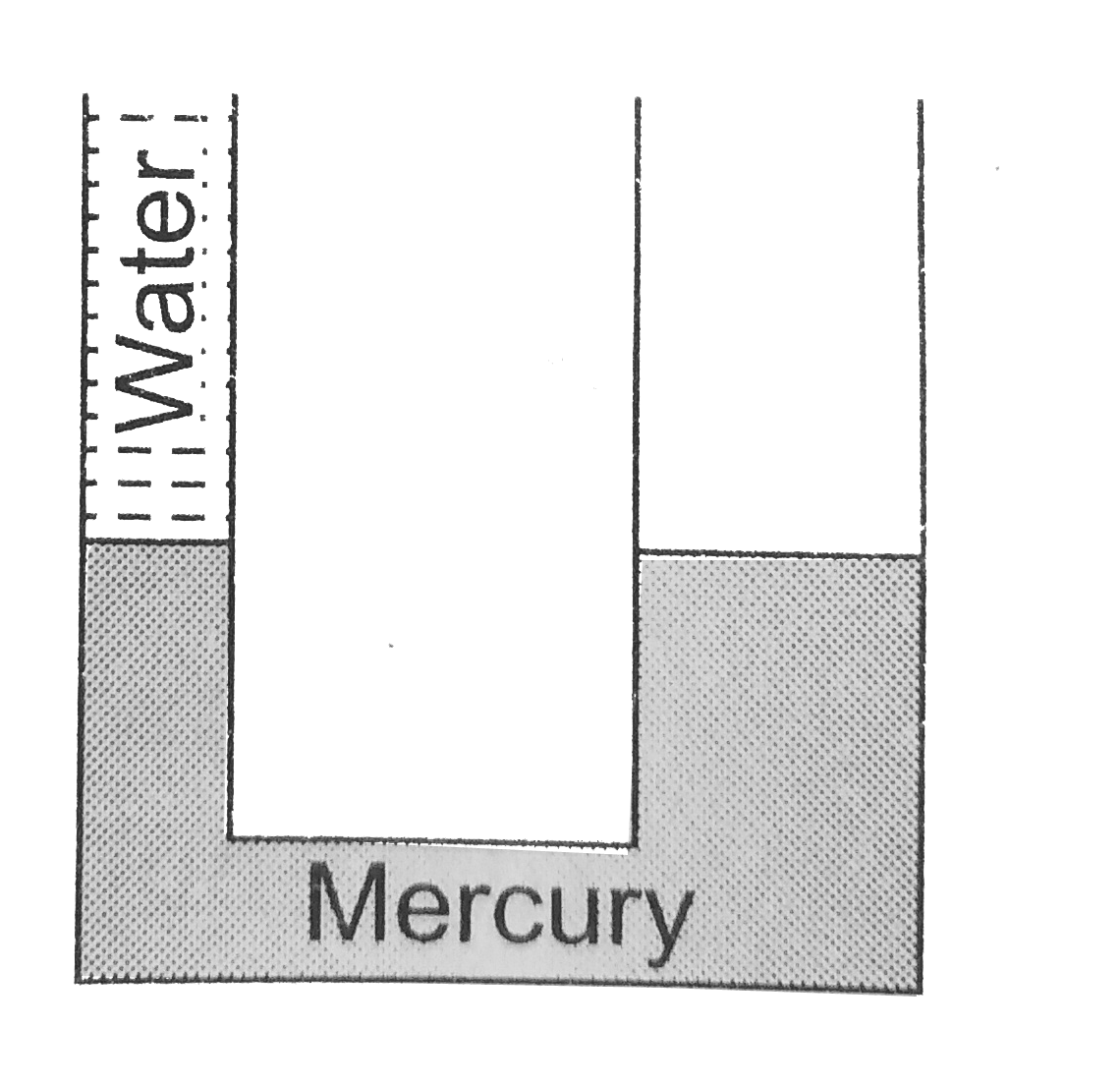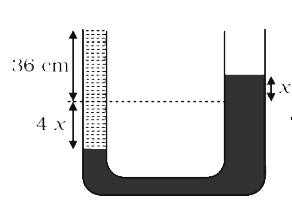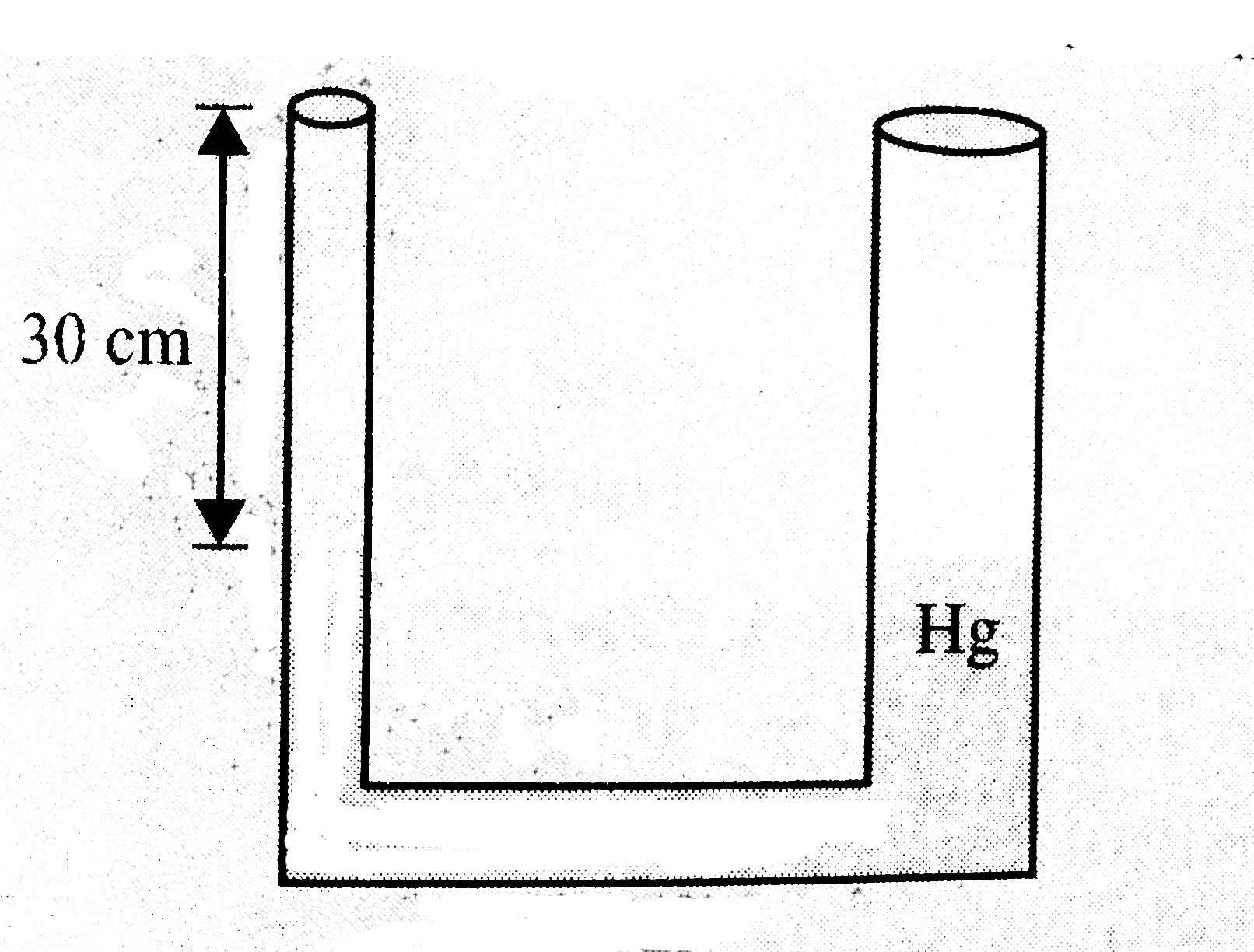A U -tube in which the cross - sectional area of the limb on the left is one quarter, the limb on the right contains mercury (density13.6g/cm3). The level of mercury in the narrow limb is at a distance of 36 cm from the upper end of the tube. What will be the rise in the level of mercury in the right limb if the left limb is filled to the top with water ?

1.2 cm
2.35 cm
0.56 cm
0.8 cm
The correct Answer is:C
(36+4x)×1g=5×13.6×g
⇒x=0.56cm

Similar Questions
A U-tube in which the cross-sectional area of the limb on the left is one-third of the limb on the right contains mercury (density 13.6g/cm3). The level of mercury in the narrow limb extends to a distance of 30cm from the upper end of the tube. What will be the rise in the level of mercury in the right limb, if the left limb is filled to the top with water (neglect surface tension effects)?

View SolutionMercury is poured into a U-tube in which the cross-sectional area of the left-hand limb is three times smaller than that of the right one. The level of the mercury in the narrow limb is a distandce l=30cm from the upper end of the tube. How much will the mercury level rise in the right-hand limb if the left one is filled to the top with water?
View Solution
Knowledge Check
A U -tube in which the cross - sectional area of the limb on the left is one quarter, the limb on the right contains mercury (density13.6g/cm3). The level of mercury in the narrow limb is at a distance of 36 cm from the upper end of the tube. What will be the rise in the level of mercury in the right limb if the left limb is filled to the top with water ?
 A1.2 cmB2.35 cmC0.56 cmD0.8 cm
A1.2 cmB2.35 cmC0.56 cmD0.8 cmArrange the following steps in proper sequence to determine the pressure exerted by a gas enclosed in a container using a manometer.
(A) Connect one end of the manometer to the container filled with gas.
(B) Both the limbs of the manometer are exposed to air, mercury level in both the limbs are equal due to atmospheric pressure
(C) Determine the difference in level of the mercury in both the limbs of the manometer (t).
(D) If the level of the mercury in the limb connected to the container is above the mercury level in the limb exposed to air, the pressure of the gas in the container is determined as atmospheric pressure - l
(E) If the level of the mercury in the limb connected to the container is above the mercury level in the limb exposed to air, the pressure of the gas in the container is determined as atmospheric pressure +l
(F) Note the level of the mercury in the limbs of the monometer.AA B C E F EBE B A D C FCB A C F D EDB C D A F EArrange the following steps in proper sequence to determine the pressure exerted by a gas enclosed in a container using a manometer.
(a)Connect one end of the manometer to the container filled with gas.
(b)Both the limbs of the manometer are exposed to air, mercury level in both the limbs are equal due to atmospheric pressure.
(c )Determine the difference in level of the mercury in both the limbs of the manometer (l).
(d) If the level of the mercury in the limb connected to the container is above the mercury level in the limb exposed to air, the pressure of the gas in the container is determined as atmospheric pressure -l.
(e ) If the level of the mercury in the limb connected to the container is below the mercury level in the limb exposed to air, the pressure of the gas in the container is determined as atmospheric pressure +l.
(f) Note the level of the mercury in the limbs of the manometer.Aa b c e f eBe b a d c fCb a c f d eDb c d a f e
Both limbs of a 'U' tube are of equal length. One of the limbs is sealed and contains a column of 28 cm of air at atmospheric pressure. The air is separated from the atmosphere by mercury. What will be the height of air in the sealed limb, if the other limb is now filled to the top with mercury ? Atmospheric pressure is 76 cm of mercury.
View SolutionWhen one limb of a manometer is connected to a container filled with a gas, the level of the mercury in the other limb rises by 'h' cm. Then the pressure of the gas in the container is 76+h cm of Hg.
View SolutionThe lower end of a capillary tube is immersed in mercury. The level of mercury in the tube is found to be 2 cm below the outer level. If the same tube is immersed in water, up to what height will the water rise in the capillary ?
View SolutionA manometer tube contains mercury of density 13.6×103 kg m−3. What difference in the levels of mercury in the two arms is indicated by a gauge pressure of 1.03×105Pa?
View SolutionA vertical uniform U tube open at both ends contains mercury. Water is poured in one limb until the level of mercury is depressed 2cm in that limb. What is the length of water column when this happens.
View Solution
